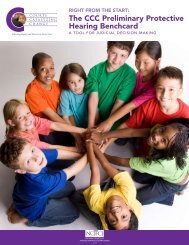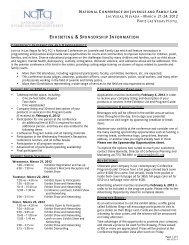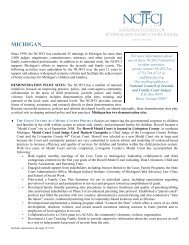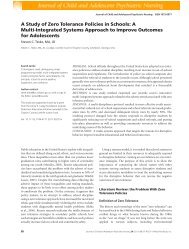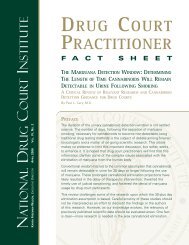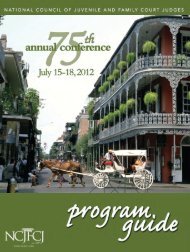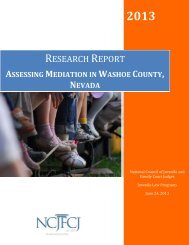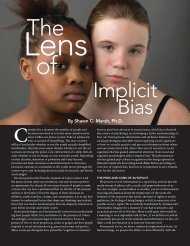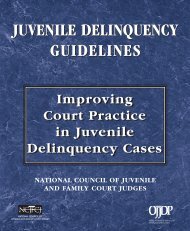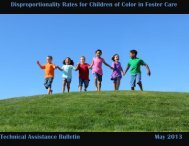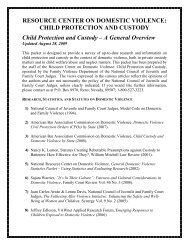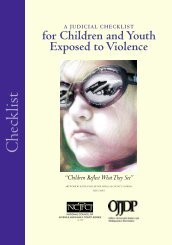EDUCATION UNDER ARREST: - Justice Policy Institute
EDUCATION UNDER ARREST: - Justice Policy Institute
EDUCATION UNDER ARREST: - Justice Policy Institute
- No tags were found...
You also want an ePaper? Increase the reach of your titles
YUMPU automatically turns print PDFs into web optimized ePapers that Google loves.
<strong>EDUCATION</strong> <strong>UNDER</strong> <strong>ARREST</strong> 15POLICE INTERROGATE A STUDENT FORFIRING SPIT BALLSIn winter of 2011, police interrogated a 14-year-oldSpotsylvania County, Virginia student for shooting plastic“spitwads” at other students in the hallway. The studentwas ultimately given suspension for the remainder of theschool year (approximately 6 months), which the studentand the family were challenging at the time of the newsbroadcast about the incident.The father of the student told Fox News: “It takes four stateagencies to go after someone with a spitwad: It takes thesheriff's department, the commonwealth attorney, theschool board on various levels and the department ofjuvenile justice … what a fine use of taxpayer resources.”Source: Diane Macedo, “Virginia Teen Suspended, FacingCriminal Charges for Shooting Plastic Spitballs in School”, FoxNews, February, 3, 2011.www.foxnews.com/us/2011/02/03/virginia-teen-expelled-facingcriminal-charges-shooting-plastic-spitballs/#ixzz1ZLlwq9ionumber of referrals directly to the juvenile justicesystem increased dramatically, fromapproximately 89 referrals per year in the 1990sto 1,400 per year in 2004. 44Academic research also shows that schools withSROs are more likely to have arrests for minoroffenses. In a three-year study of 13 schools withan SRO and 15 schools without in a Southeasternschool district with both urban and suburbancharacteristics, Matthew Theriot, a professor atthe University of Tennessee, found that theschools in the study that had SROs had nearlyfive times the number of arrests for disorderlyconduct as schools without an SRO, even whencontrolling for the level of economicdisadvantage of the school. 45 The high rate ofarrests for disorderly conduct is particularlyconcerning because it could include a range ofbehavior subjectively judged to bedisruptive. For example, a youth couldbe determined to be disorderly foroverturning a desk in a classroom,having an argument with a teacher, orgetting into a minor schoolyard fight.These incidents could be handled in anynumber of ways besides arresting thoseinvolved. The study also finds thatregardless of the level of schooldisadvantage, the number of arrests donot change if an SRO is present.Data gathered in Jefferson County,Alabama finds further evidence thatstudents are not being arrested andreferred to the juvenile justice system formore serious offenses such as dealingdrugs or brandishing a gun. In the 2007-08 school year, 96 percent (491) ofstudents in Birmingham were referred to thejuvenile court for misdemeanor offenses orviolations. 46 Twenty-nine percent of themisdemeanor and violation referrals were fordisorderly conduct, which can be open tointerpretation, but includes any interruption ofthe orderly conduct of the school, and 33 percentof the referrals were for affray, which can bedefined as group fighting in a public place thatdisrupts peace.The presence of school resource officers createsthe opportunity for an increased application ofthe law directly to students and school situationswithout the filter of school administrators orpolicies. Research in the community reinforcesthis theory: more police and more resources forpolice in neighborhoods are likely to increaseSROS TEACH KIDS TO DISTRUST POLICEOn the first day of school in Lee County, Florida, four students received $57 citations for not wearingbicycle helmets from the Lee County Sheriff’s Office school resource officer. Both the state and the schoolrequire youth under the age of 16 to wear helmets when riding bicycles, however parents in this case feltthat the SRO should have issued a warning first. One student’s father says of the incident:“(The citation) just left a poor taste in the kids’ mouths. I listen to them and they don’t like the cops. Theywant to stay away from them. The sheriff’s department spends a lot of money on public relations in tryingto get the youth. I think this undermines everything they do.”Source: Chris Umpierre, “Lee deputies cite helmetless schoolkids,” Florida News Press, August 11, 2011



